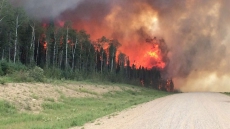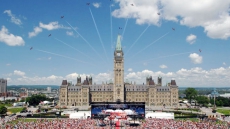REGINA — The number of people forced from their homes by Saskatchewan wildfire smoke continues to climb, but a provincial official says the smoke is now
so thick that it's actually helping control the fires.
Steve Roberts with Saskatchewan's environment ministry says the layer of smoke that covers the northern part of the province has blocked out direct sunlight.
Roberts says that's lowered temperatures and boosted humidity, which means the fires are less volatile.
Officials say they don't have an estimate of the total number of evacuees, but say they're currently housing over 4,000 people in hotels and other evacuation
centres in North Battleford, Prince Albert, Saskatoon and Regina.
There were 110 active fires in Saskatchewan on Wednesday, and of them, only about 10 were contained.
The smoke hampered the operations of firefighting aircraft on Tuesday, and Roberts says air tankers are on standby if smoke clears and visibility is safe for
them to fly.
"As much as it's not good for people, because the cloud layer filled with smoke and is so thick, our temperatures are roughly 10 degrees cooler and our
humidity is 10 to 15 per cent higher. That combination means the fire activity drops significantly," Roberts explained.
"It's helped us secure, especially, those fires that are close to communities by putting people on the ground and getting some hose lines in place."
Roberts said conditions in Saskatchewan are so susceptible to fires due to an unusually dry winter followed by an early spring. He said evacuations could
continue for days to come.
Close to 600 firefighters, 40 helicopters and 19 planes are involved in fighting the fires. Other provinces have contributed firefighters and equipment, and Roberts
said a crew from South Dakota was on its way to Saskatchewan on Wednesday.
Karri Kempf, manager of emergency services with social services, said officials are rotating the destinations where evacuees are being sent. She said that
allows staff to have time to increase capacity and set up extra facilities before more evacuees arrive.
On Wednesday, Kempf said Prince Albert was full and that Regina was the current destination.
"For the most part, people are quite anxious and nervous of the situation back home but their spirits seem to be good under the circumstances," Kempf said.





